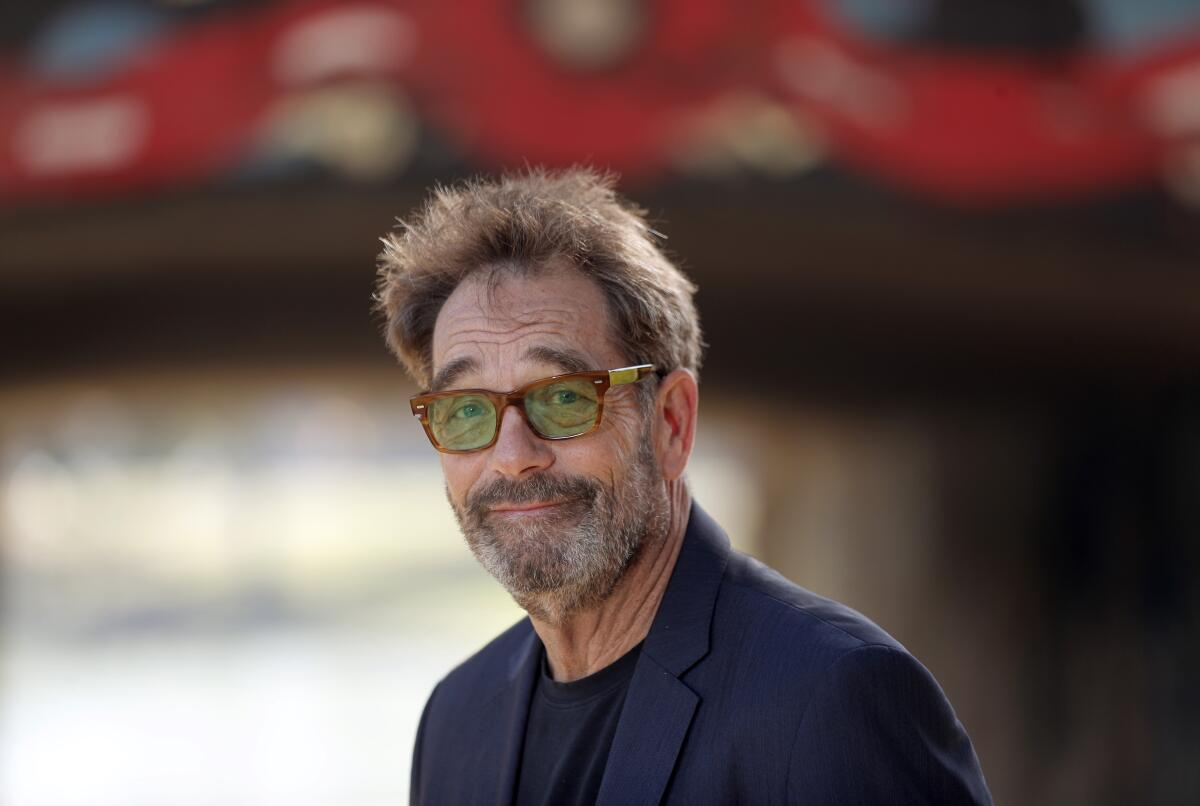Huey Lewis on his struggle with hearing loss: ‘I thought I might as well kill myself’

- Share via
Huey Lewis remembers his first encounter with the sound that would help make him one of the biggest pop stars of the 1980s.
Already in his early 30s, with a flop debut and a moderately successful follow-up behind him, the singer was hard at work on a do-or-die third album with his Bay Area band, the News, at the Record Plant in Sausalito. Also at the now-shuttered studio were the members of Jefferson Starship, who’d enlisted Peter Wolf — not the J. Geils Band frontman but the Austrian producer — to punch up their music with various synths and drum machines.
“They were doing gengku-gengku-gengku-gengku,” Lewis said, imitating the mechanized rhythm of the just-introduced LinnDrum sequencer, “and I was like, ‘This is what I’ve been looking for.’” The image calls to mind that scene from “Back to the Future,” the film for which Lewis would later write the chart-topping “The Power of Love,” where Chuck Berry’s cousin calls him from the principal’s office to report that he’s discovered rock and roll. “So on a break I said, ‘Peter, how do we get this thing going?’”
The result was “Sports,” Huey Lewis & the News’ ultra-slick 1983 LP that set Lewis’ gruff white-soul vocals over crisp digitally enhanced grooves — and spun off five hit singles on its way to seven-times-platinum sales. “‘Sports’ looks like a bar-band record, but it was assembled and perfected and overdubbed and tweaked and over-mixed,” Lewis said, coming close to quoting Patrick Bateman’s famous praise of the band’s “consummate professionalism” from “American Psycho.” “We aimed every song right at Top 40 radio.”

What strikes you about this story is that four decades ago Lewis could hear the future down the hall at the Record Plant. While today he can barely hear at all.
In early 2018, Lewis was diagnosed with Meniere’s disease, a poorly understood disorder of the inner ear. He’s not deaf; the condition fluctuates, so on some days conversation is relatively easy with the assistance of a hearing aid. But music now sounds to him like little more than distortion, which makes finding his pitch too difficult for him to be able to sing.
“It’s brutal. When it first happened, I thought I might as well kill myself,” Lewis said on a recent visit to Los Angeles from his adopted home of Montana, where he lives on a sprawling ranch and can fly fish to his heart’s content. (“More cheese, less rats,” he said of what initially drew him there from his native Marin County.) Sitting on a bench in MacArthur Park — a handsomely grizzled version of the lovable all-American hunk once inescapable on MTV — he explained that he was having a pretty good day, hearing-wise. “1 to 10, I’m a 6,” he said. “When I’m bad, though, I almost can’t hear anything.”

Perhaps one of the more tragic aspects of the situation is that it happened just as a late-career moment was shaping up for Lewis, who will turn 70 in July. A jukebox musical based on his durable golf-bro ’80s classics — among them “The Power of Love,” “Hip to Be Square” and, of course, “Sports’” thumping opener, “The Heart of Rock and Roll,” after which the production is titled — premiered a year and a half ago at San Diego’s Old Globe Theatre and is aiming for Broadway. Younger musicians such as Vampire Weekend’s Ezra Koenig (who hosted Lewis on his Beats 1 radio show last year) have encouraged a reconsideration of an object of only begrudging critical respect back in the day.
And for the first time in nearly 20 years, Lewis and the News — never less than a reliable live draw on the road — were working on an album of original tunes. Now, with his prospects as a performer uncertain, Lewis is releasing a half-finished version of that record: the seven-track “Weather,” due Friday, which collects the material he and the band had completed before his hearing gave out.
“These songs, they’re great fun,” Lewis said of new cuts like the breezy “While We’re Young” and “Her Love Is Killin’ Me,” a tidy blues number with a music video featuring cameos by some of his pals and admirers from music, Hollywood and the sports world, including Brandon Flowers of the Killers, Jimmy Buffett, Jimmy Kimmel, Andy Garcia, Joe Montana and former San Francisco Giants manager Bruce Bochy. “It’s incredibly frustrating not to be able to sing ’em.”

As a kid, Lewis had frequent earaches. “My old man was a doctor, and he told me, ‘You got crappy eustachian tubes,’” he recalled as a cameraman hovered nearby, collecting footage for an upcoming documentary on the singer. (“Everybody’s doing it,” he figured of the life-on-film approach. “But we’re gonna kick Linda Ronstadt’s ass.”) After he lost much of the hearing in one of his ears in the mid-’80s, Lewis learned to get by with the remaining one. But then came “that notorious day in Dallas,” as Johnny Colla, who’s played guitar and saxophone with the News since the beginning, put it over the phone.
It was Jan. 27, 2018, and Lewis could tell something was wrong even before he got onstage for a private gig. He’d had trouble hearing his bandmates talk in a business meeting earlier in the day; everything was muffled, like “listening through a blown speaker,” he said. “Then we get up there and it’s a real disaster,” Colla remembered. “Huey apologized after the show. At first you’re kind of pissed: ‘Get it together, man — this is our career!’ Later, the mood changed.”
Lewis says he’s consulted every medical expert he can find, including folks from the House Ear Institute, the Stanford Ear Institute and the Mayo Clinic. “I’ve talked to Dr. Steven Rauch, the big daddy of them all, at Mass General Eye and Ear. Tried chiropractic, acupuncture, low-salt, all-organic, no caffeine, no chocolate, essential oils, all the holistic stuff,” he said. “None of it works.” The best he can hope for is stabilizing somewhere near the upper end of that 1-to-10 scale; one time, he said, he went 21 days without dropping below a 5.
Having weathered the initial blow of his diagnosis, though, Lewis is surprisingly upbeat for a man whose livelihood hangs in the balance. The night before our chat, he had a ball trading music-biz stories over dinner with Phil Carson, the old-school record exec known for his relationships with Led Zeppelin and AC/DC. And in MacArthur Park, his eyes crinkled behind a pair of tinted glasses as he joked about golf and basketball and the latest outrage by President Trump, whom he referred to as “the big orange dummy.”

Kimmel, who frequently fly fishes with Lewis in Montana, said he wondered if he’d been a bad friend when he read that the singer had had suicidal thoughts. “It made me think I needed to be in closer touch,” said the late-night host. “But Huey’s not a guy who burdens you with his worries or his emotions. He’s very much a rub-a-little-dirt-on-it kind of guy.”
Looking ahead, Lewis — who separated from his wife years ago after having a son and a daughter, both now in their 30s — is more optimistic about working again in the studio than onstage, where the music has to be louder than he can currently handle. The same goes for Colla, who points out that promoters are reluctant to take a chance on a legacy act that may not deliver. The guitarist recently convened the News for a small rehearsal to check on Lewis’ progress; it lasted seven minutes, he said.
As Lewis stood from the park bench to head to his next appointment, he found he’d been sitting on a religious pamphlet advertising the value of God’s help. He took a quick look and placed it back on the bench.
“Let him work on somebody who might show a little improvement,” he said with a laugh.
If you or someone you know is exhibiting warning signs of suicide, seek help from a professional and call the National Suicide Prevention Lifeline at 1-800-273-TALK (8255).
More to Read
The biggest entertainment stories
Get our big stories about Hollywood, film, television, music, arts, culture and more right in your inbox as soon as they publish.
You may occasionally receive promotional content from the Los Angeles Times.








